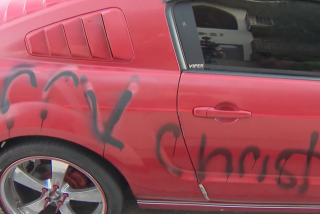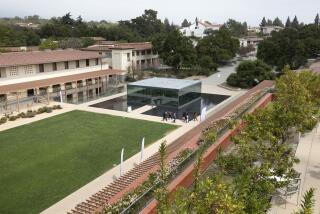Conviction in False Hate Crime Case
A former Claremont McKenna College professor accused of spray painting racist slogans on her car and then blaming students for the vandalism was convicted Wednesday of attempted insurance fraud and filing a false police report.
Kerri Dunn, 39, a former visiting psychology professor, showed no emotion as a Los Angeles County Superior Court jury in Pomona rendered its verdict. Dunn faces up to 3 1/2 years imprisonment when she returns to court for sentencing Sept. 17.
For the record:
12:00 a.m. Aug. 20, 2004 For The Record
Los Angeles Times Friday August 20, 2004 Home Edition Main News Part A Page 2 National Desk 1 inches; 34 words Type of Material: Correction
Hate crime hoax -- An article in Thursday’s California section on the conviction of a former professor involved in an alleged hate crime hoax misidentified Claremont McKenna College student Robert Carpenter as Richard Carpenter.
The jury, which deliberated four hours, was not asked to determine whether Dunn vandalized her own car. Instead, the panel was asked whether she had made false statements to the authorities and her insurer about the damage.
News of the verdict spread quickly among students of the Claremont Colleges, who were first outraged that an apparent hate crime had been committed against a professor, then shocked when authorities later accused Dunn of staging the incident.
“I’m glad justice was done,” said Claremont McKenna College junior Richard Carpenter, 19. “She’ll get what she deserves.”
Carpenter was one of a number of students who organized large protests at the five undergraduate Claremont Colleges after the apparent hate crime.
School officials were circumspect in commenting on the verdict Wednesday, and issued only brief written statements.
“The events of March 9 were damaging to the college and the greater Claremont community, and we are grateful to have a resolution through a court proceeding,” wrote Claremont McKenna College President Pamela Brooks Gann.
The conviction stemmed from a March 9 incident in which Dunn told police that her 1990 Honda Civic had been vandalized.
Dunn said she was returning from a forum on racial intolerance when she found that her tires had been slashed, her windows smashed and the car covered with graffiti.
Dunn told police that thieves had also stolen more than $1,700 worth of personal property from the car, including a $500 Coach briefcase and a $600 Palm Pilot.
But after two eyewitnesses came forward saying they thought they had seen Dunn vandalize her own car, she was accused of staging the incident. Police also noticed inconsistencies in her statements, prosecutors said.
Shortly after the verdict was read Wednesday, Dunn’s lawyer issued a statement saying that his client still maintained her innocence and that Superior Court Judge Charles Horan erred by barring crucial evidence.
Specifically, defense lawyer Gary Lincenberg said that jurors were not allowed to hear testimony from an insurance expert, saying that the defendant had never actually filed an insurance claim.
“The jurors convicted because the court did not allow them to hear this important and uncontradicted testimony,” wrote defense lawyer Gary Lincenberg. “We intend to appeal the conviction based upon the court’s erroneous ruling.”
Los Angeles County Deputy Dist. Atty. Martin Bean disagreed, saying that Horan did extensive research on the matter.
However, Bean acknowledged that it was a difficult issue. “The law regarding insurance fraud makes the definition of claim a bit unclear,” Bean said.
Juror Lilly Walters of Claremont said the verdict hinged on statements Dunn made concerning when she had last seen her car.
Dunn told police that she had parked her car and left it at a campus parking lot about 2 p.m., while a witness, Dominique Zepeda, said she saw Dunn park her car in the lot about 8 p.m.
“There was strong evidence ... that she lied in the police report,” Walters said.
More to Read
Sign up for Essential California
The most important California stories and recommendations in your inbox every morning.
You may occasionally receive promotional content from the Los Angeles Times.










